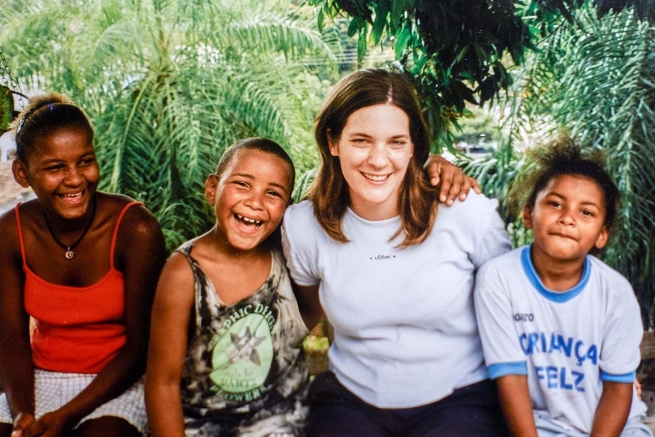Annegret Kohnen-Spitz wanted to go to Bolivia after graduating from high school in 2000. “But I definitely wanted to go to a Spanish-speaking country,” she says when she talks about her voluntary service with the Salesians of Don Bosco more than twenty years later. She ended up being in Brazil. “I can still hear the voice of Fr. Karl Oerder SDB: Brazil is very close to Bolivia and Portuguese is almost Spanish.”
As recommended, the then 19-year-old arranged travel insurance in the following weeks and arranged the flight. A few months later, she landed in Corumbá, Brazil, to spend a year working with socially disadvantaged children.
Kohnen-Spitz belongs to the early generation of Don Bosco Volunteers. “Twenty-five years ago, in 1996, we sent a volunteer abroad for the first time, to Ireland,” recalls Father Stefan Stöhr, coordinator for volunteer services at the Salesians of Don Bosco in Germany. “A lot has happened since then,” he says, referring not only to the more than 800 young men and women who followed the example of the “Ireland pioneer” and completed a voluntary service abroad with the worldwide youth charity. In 2003, the first employee was hired for Don Bosco Volunteers. Since 2008, the Salesians of Don Bosco have been sending volunteers through the “weltwärts” program of the German Federal Ministry for Economic Cooperation and Development, and since 2010, has also been deploying volunteers in Germany as part of the Voluntary Social Year and the Federal Volunteer Service. In the past eleven years, more than 400 volunteers have done voluntary service in Don Bosco institutions in Germany.
With every new step and experience, the work with young volunteers also experienced a boost in professionalism. In particular, the preparation of young people for their time abroad has changed. While in the early years, the preparation consisted of a only single meeting to study a large map of the world spread out in the center of the room, watch a projected video about Haiti and identify the desired location, today an information weekend and three preparatory seminars lasting several days take place over the course of a year. This enables prospective volunteers to prepare for their year abroad better than ever before. Support for volunteers during and after their service and emergency management have also been significantly professionalized and expanded.
The goals of the volunteer service have always remained the same: “Those who spend a year volunteering in our global community recognize their own strengths and weaknesses, become more independent and get to know other modes of life,” explains Father Stöhr. “When volunteers help children and young people in Germany and around the world, they also get to know themselves better, and develop their own personalities”.
Emma Dierkes, 20, was a Don Bosco Volunteer in Rwanda from September 2019. Today, she is studying to become a primary school teacher and benefits enormously from her experiences in the East African country when working with the children. This ranges from pedagogical elements she learned there during her practical work to very personal experiences. “Now when I talk to children who don't have German as their mother tongue, I have much more understanding,” she emphasizes. At the beginning of her assignment, she had a hard time communicating in French, which she learned at school.
For her work with street children and at school, she also had to learn Kinyarwanda, which is the national language in Rwanda along with French and English. The fact that all language instruction was in French also made learning the new language difficult. Since then, she knows “what it feels like when someone talks about you and you hear your name, but you don't know what people are saying about you,” she says.
Annegret Kohnen-Spitz came back from Brazil full of energy and realized what privileges she has in Germany. “I felt such an ease in life here,” she recalls. She said she felt like starting her studies and at the same time realized how lucky she was to have the opportunities she had in Germany. After all, she had met many people of her age in Brazil who had to work during the day in order to be able to study in the evening. “I think I came back and somehow felt more grateful about the opportunities I have here,” she sums up.
She learned to love Brazil, despite the new language she had to learn. She soon returned to Corumbá for two semesters abroad during her studies. It was an experience she hopes her children will have as well. “Hopefully they, too, will have the opportunity to learn so much about themselves and the world as volunteers abroad when they are that age,” she says thoughtfully. “If that was taken away, something great would be taken away.”
Christoph Sachs
https://www.infoans.org/en/component/k2/item/14095#sigProId19c7107519



